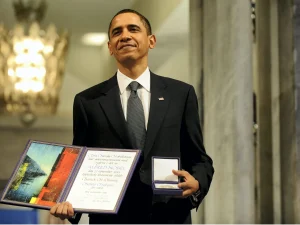The Nobel Peace Prize, since its inception, has been awarded to those who, in the words of Alfred Nobel’s will, have “conferred the greatest benefit to humankind” through the promotion of “fraternity between nations.” It is meant to be a beacon, recognizing extraordinary efforts to end conflict and alleviate human suffering. Yet, the pursuit of this esteemed accolade can sometimes reveal a stark contrast between political theater and tangible human outcomes.
The Calculated Campaign for a Legacy Forged in Symbolism
The case of former President Donald Trump’s repeated lobbying for the Nobel Peace Prize, while his policies and silence actively enabled a devastating conflict in Gaza, presents one of the most profound contradictions in modern political history.
This dichotomy exposes how the quest for a symbol of peace can be divorced from the grim realities of war and suffering, raising critical questions about the price of peace and the moral weight of the award itself.
Donald Trump’s fascination with the Nobel Peace Prize is not a hidden secret but a public and persistent campaign.
His efforts to be associated with the award reveal a deep understanding of its symbolic power to reshape a legacy otherwise marked by domestic tumult and international discord.
The Abraham Accords: A Foundation for Nomination
The central pillar of Trump’s claim to the prize rests on the Abraham Accords, a series of agreements normalizing relations between Israel and the United Arab Emirates and Bahrain, followed later by Sudan and Morocco.
Brokered by the Trump administration in 2020, these accords were hailed as a historic breakthrough, a tangible shift in the Middle Eastern geopolitical landscape that broke the long-standing Arab consensus that normalization with Israel must be predicated on a resolution to the Palestinian issue.
For Trump and his supporters, this was a masterstroke of diplomacy worthy of the world’s highest peace honor. His allies in Congress formally nominated him.
Right-wing media outlets championed his cause, framing the Accords as a transformative achievement that previous administrations had failed to accomplish.
The narrative was powerful: a pragmatic dealmaker had achieved what career diplomats could not, bringing “peace” to a region perpetually mired in conflict.
The desire for the Nobel Peace Prize was, in this context, framed as a rightful acknowledgment of a monumental success.
It was a bid to cement a legacy not as a disruptor, but as a peacemaker, to inscribe his name alongside previous American laureates like Theodore Roosevelt and Barack Obama, whose award was a particular source of irritation for Trump.
The Politics of Performance over Substance
However, a closer examination reveals a pursuit often focused more on the performance of peacemaking than its profound, lasting implementation.
The campaign for the Nobel Peace Prize was characterized by public boasts and relentless lobbying. Trump repeatedly expressed his belief that he was owed the award, once stating, “They gave it to Obama.
He didn’t even know what he got it for.” This sentiment reduces the prize to a transactional token of validation, a trophy to be won in a contest of prestige rather than the culmination of a lifelong dedication to peace.
The Accords themselves, while significant, were arguably less about fostering a comprehensive, just peace and more about creating a strategic anti-Iran alliance between Israel and Sunni Arab Gulf states.
The Palestinians were not merely sidelined in these negotiations; their core interests—statehood, the right of return, the status of Jerusalem—were effectively bypassed.
The agreements secured diplomatic and economic ties between governments but did little to address the underlying grievances that have fueled the Israeli-Palestinian conflict for decades.
The pursuit of the Nobel Peace Prize was thus built on a foundation that ignored the central party in the regional conflict, treating the Palestinian question as an inconvenient obstacle to a larger geopolitical realignment rather than the very heart of the matter.
This approach sowed the seeds for the instability that would later explode into catastrophic violence.
The Unseen Cost: Silence and Complicity in the Face of Catastrophe
If the pursuit of the Nobel Peace Prize represents the zenith of symbolic politics, then the policy towards the Israeli-Palestinian conflict, particularly the war in Gaza, represents its nadir.
The stark contrast between trumpeting diplomatic achievements and responding to humanitarian catastrophe reveals a troubling hierarchy of priorities where legacy-building trumps human life.
Unwavering Support and the Green Light for Assault
Long before the October 2023 war, the Trump administration’s policies had significantly exacerbated the conditions in Gaza.
The decision to move the U.S. embassy to Jerusalem, recognizing Israeli sovereignty over the occupied Golan Heights, and cutting off funding to the UN Relief and Works Agency for Palestine Refugees (UNRWA) were not neutral acts.
They were widely perceived as a wholesale endorsement of the most hardline Israeli positions, undermining the prospects for a two-state solution and emboldening the forces of settlement and expansion.
When the devastating war in Gaza erupted following Hamas’s horrific October 7th attacks, Trump’s response as a private citizen and the de facto leader of the Republican Party was telling.
Rather than calling for restraint or a ceasefire, his public statements offered unqualified support for Israel’s military campaign.
He referred to Israel’s actions as a necessary response, often framing the conflict in stark, simplistic terms. This rhetoric, echoing from a figure of immense influence within his party, contributed to a political environment in the U.S.
where unconditional military and diplomatic support for Israel’s operation was the default position, despite the mounting Palestinian death toll, which included thousands of women and children.
This unwavering support can be interpreted as a de facto green light.
For an Israeli government already inclined towards a forceful response, knowing that its most powerful ally would not impose any meaningful costs or consequences for its actions removed a significant potential constraint.
The silence on the humanitarian catastrophe—the bombing of hospitals and refugee camps, the siege cutting off food, water, and medicine—was deafening.
The same man who actively campaigned for a Nobel Peace Prize had nothing to say about the indiscriminate killing of civilians or the unfolding famine. The prize symbolizes a commitment to life and fraternity; the silence endorsed its opposite.
The Moral Bankruptcy of the “Deal of the Century”
The context for this response is Trump’ own “Vision for Peace,” often dubbed the “Deal of the Century.” Unveiled in 2020, the plan was overwhelmingly rejected by Palestinians as a surrender document.
It proposed allowing Israel to annex large swathes of the West Bank, offered a fragmented, non-sovereign Palestinian entity with no control over its borders or airspace, and left Jerusalem as Israel’s undivided capital.
For Palestinians, it was the final proof that the U.S. could no longer be an honest broker.
When the war broke out, the legacy of this plan was evident. It had demonstrated a profound disregard for Palestinian aspirations and rights, treating them as a problem to be managed rather than a people with legitimate national claims.
This underlying philosophy—that Palestinian suffering is an acceptable price for Israeli security—informed the reaction to the war.
The pursuit of the Nobel Peace Prize for a plan that Palestinians saw as their negation is the ultimate irony. It highlights a worldview where peace is a arrangement imposed by the powerful upon the weak, a signature on a document, rather than a condition built on justice, mutual recognition, and dignity.
It is a vision utterly incompatible with the spirit of the Nobel Peace Prize, which seeks to honor those who lift up the oppressed, not those who ignore their plight.
The Tarnished Trophy: What the Nobel Peace Prize Truly Demands
The profound disconnect between Trump’s ambition for the Nobel Peace Prize and his stance on Gaza forces a re-examination of what the award should truly represent.
It is not merely a reward for a single diplomatic agreement, but a recognition of a consistent, moral commitment to the principles of peace.
The Ghost of Alfred Nobel: A Measure of True Benefit to Humanity
Alfred Nobel’s will specifies that the prize should go to whoever has done the “most or the best work for fraternity between nations, for the abolition or reduction of standing armies and for the holding and promotion of peace congresses.” This is a high bar that encompasses both achievement and intention.
The Abraham Accords, for all their strategic value, were not a peace congress that included all relevant nations. They did not reduce standing armies;
in fact, they were followed by massive U.S. arms sales to the signatory states. Most critically, they explicitly excluded the nation whose fraternity is most essential to a lasting peace in the region: Palestine.
A true laureate’s work would not create a peace that exists only between governments while a people under occupation suffer in an open-air prison.
A true commitment to “fraternity between nations” would necessitate speaking out when one of those nations engages in a military campaign that has been described by the International Court of Justice as plausibly constituting genocide.
The silence on Gaza is not a neutral omission; it is an active moral choice that disqualifies the claimant from being considered a standard-bearer for peace.
The Nobel Peace Prize cannot be awarded for a deal that inadvertently contributed to the conditions for a humanitarian nightmare. To do so would be to empty the award of all its meaning and reduce it to a tool of realpolitik.
The Legacy of Contradiction
Ultimately, the story of Trump’s quest for the Nobel Peace Prize and his position on Gaza is a lesson in the difference between the performance of politics and the substance of principle.
It shows how a symbol of peace can be coveted by those who are willing to overlook immense human suffering for political gain.
The relentless campaign for the award was about crafting a narrative. The silence on Gaza was the reality.
This contradiction serves as a mirror for the international community. It challenges the very committees, governments, and public figures who consider such nominations.
It asks: What is peace? Is it the absence of war between states, or is it the presence of justice for all people? Can a leader claim to have conferred the “greatest benefit on humankind” while turning a blind eye to a population being decimated by war and famine?
The Nobel Peace Prize remains a powerful symbol because of the moral weight it carries. Awarding it requires a rigorous examination of both achievements and failures, of words and actions, of symbols and substance.
To honor a figure who has remained silent in the face of a crisis like Gaza would be to betray the spirit of Alfred Nobel and send a message that some lives are worth less than others in the calculus of peace.
The true worth of the Nobel Peace Prize is not in the prestige it confers upon an individual, but in the unwavering commitment to humanity it demands.
That is a standard that must be upheld, even when—especially when—it means denying the award to the world’s most powerful suitors.
source: raialkhalij


